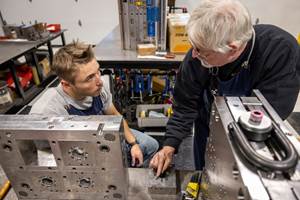New Tax Rules for Employee Parking Expenses
The qualified transportation fringe with the greatest impact on mold builders is qualified parking provided to their employees at no cost.
If mold shops are unfamiliar with the term Qualified Transportation Fringes (QTFs), they will know the term when they file their 2018 Federal income tax return. The reason is the Tax Cuts and Jobs Act (the Act), which does not allow any deduction for QTFs provided by mold shops to their employees, and is effective for amounts paid or incurred after December 31, 2017.
QTFs include any transportation in a commuter highway vehicle between the employee’s residence and place of employment, any transit pass and qualified parking, which is defined as parking provided to an employee on or near the business premises of the employer, or on or near a location from which the employee commutes to work. The QTF with the greatest impact on mold builders is qualified parking, as many shops provide parking for their employees at no cost to the employee.
If mold shops are unfamiliar with the term Qualified Transportation Fringes (QTFs), they will know the term when they file their 2018 Federal income tax return.
The Act does not help to determine the amount of nondeductible QTF, but proposed guidance from the IRS is forthcoming. The method chosen depends upon whether the mold shop pays a third party to provide parking for its employees. For example, the lot is not directly owned by the shop or its owners, or the shop owns or leases a parking facility where its employees park.
Generally, the amount of nondeductible expenditures is the shop’s total annual cost of employee parking paid to a third party. If the monthly cost of parking is less than $260 per employee, the entire amount is treated as nondeductible. If the monthly cost is more than $260, the amount up to $260 per employee is nondeductible and the excess amount is treated as compensation to the employee and the shop can treat it as a deductible.
Generally, the amount of nondeductible expenditures is the shop’s total annual cost of employee parking paid to a third party.
The IRS recommends the following steps to determine the amount of nondeductible expenses:
- Step 1: Calculate the disallowance for reserved employee spots.
- Step 2: Determine the primary use of remaining spots (non-reserved employee spots, general public parking, customer parking).
- Step 3: Calculate the allowance for reserved non-employee spots.
- Step 4: Determine the remaining use and allocable expenses by calculating the number of spots, the number of employees, the hours of use, or other measures.
Parking expenditures include, but are not limited to, repairs, maintenance, allocable utility costs, property taxes, insurance, allocable interest expense, snow and ice removal, trash removal, leaf removal, cleaning, landscape costs, and security expenditures.
Tool shops will likely benefit by developing processes, along with internal controls, on how to account for expenditures related to employee parking and the related tax reporting requirements.
For More Information
Mueller Prost / 314-862-2070 / mdevereux@muellerprost.com / muellerprost.com
About the Contributors
Michael J. Devereux II, CPA, CMP is a partner and director of manufacturing, distribution and plastics industry services, Joel Hundelt, CPA is a senior tax manager and Timothy O’Neill CPS is a tax supervisor at Mueller Prost.
Related Content
MMT Chats: Developing a Mold Engineering Apprenticeship Model
New mold design and 3D printing company wanted to partner with a local high school to train mold designers and a National Tooling & Machining Association Mold Design Group Apprenticeship was the answer.
Read MoreConfronting the Mold Design Talent Drought
Recently, I reposted on LinkedIn the results of an informal survey we conducted, which revealed a shortage of skilled mold designers. It quickly gained a lot of traction. Given the response, I thought I'd summarize the feedback and keep the conversation going.
Read MoreUnique Mold Design Apprenticeship Using Untapped Resources
To help fill his mold design skills gap, Jeff Mertz of Anova Innovations, is focused on high schools and underprivileged school districts, a school that has lower graduation and college entrance rates. The goal is a student-run enterprise.
Read MoreEden Tool and Eden Manufacturing: A Story of Resilience, Growth and Innovation
This critical parts manufacturer, founded on solid tooling fundamentals, didn’t get derailed with the unexpected passing of the owner because leadership was already building a solid business, not just a good tool shop. Here’s how they managed change incrementally… and they’re not finished yet.
Read MoreRead Next
Tax Reform: Changing the Rules of Business Losses
The Tax Cuts and Jobs Act has changed the way many mold builders account for their business losses. The new rules impact the tax treatment for business losses regardless of a company’s structure.
Read MoreHow to Use Continuing Education to Remain Competitive in Moldmaking
Continued training helps moldmakers make tooling decisions and properly use the latest cutting tool to efficiently machine high-quality molds.
Read MoreOvercoming Pain Points in Moldmaking with AI
Shops that embrace AI as a tool, not a threat, can enhance efficiency, preserve expertise, and attract tech-savvy talent.
Read More





















